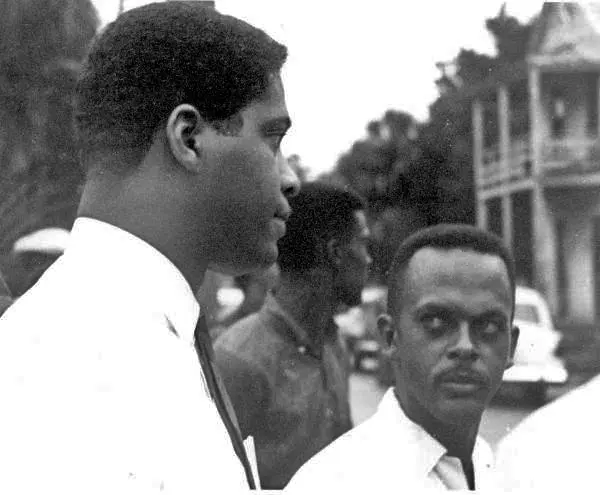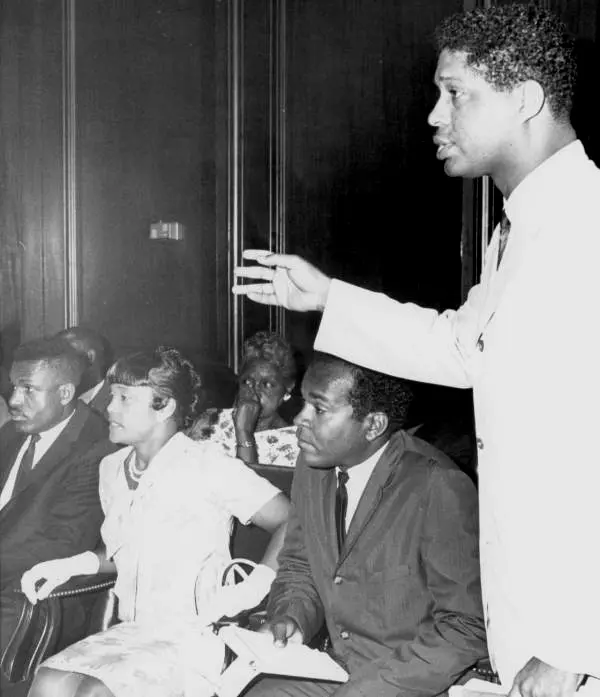In the 1960s, Dr. Robert B. Hayling was a leader of the Civil Rights movement in Florida. His former dentist’s office in St. Augustine is now a museum. Dr. Hayling died on December 20, 2015, at the age of 86.
One of Hayling’s last public appearances was at the Florida Historical Society Annual Meeting and Symposium on May 23, 2015, where he discussed his life.
Hayling grew up in Tallahassee, the son of a professor at Florida A&M University. At an early age Hayling became aware of racial inequities in America.
“To tease my grandmother a bit, I would ask her, ‘Grandmama, if black and white people can’t get along here on earth, how they gonna get along in heaven?’ And my grandmother would scream out ‘Cleo, come get this boy! God is gonna strike him dead!’ I’m still living, but I still have that question.”
After graduating from Florida A&M University in 1951 with a B.A. in Biology, Hayling volunteered to serve in the U.S. Air Force during the Korean War. He was commissioned as a 2nd Lieutenant in 1952.
“At times I would apply for different things that it wasn’t ordinary for a black to have the audacity to approach,” Hayling said. “So I did have some rejection, and then some questioning, ‘Why are you asking for these privileges or those privileges when others of your complexion have not made a disturbance?’ If that makes me a troublemaker, I plead guilty.”
After completing his service, Hayling earned his doctoral degree studying dentistry at Meharry Medical College in Nashville, Tennessee. He was active in the civil rights movement there. One night, the windows of his dormitory imploded from the shock of a dynamite blast at the home of a teacher across the street.
In 1960, Hayling moved to St. Augustine, Florida to start his dental practice.
While many older African American residents were afraid of repercussions from participating in civil rights activities, Hayling was successful in recruiting younger people to the movement as advisor to the NAACP Youth Council and a local leader of the Southern Christian Leadership Conference.
A large cross was erected in a field near St. Augustine in September 1963. The cross was to be burned during a rally of the Ku Klux Klan, which had attracted national leaders of the organization. Hayling and three of his friends tried to catch a glimpse of the rally.
“We never thought that parking on the side of U.S. 1, on the shoulder of the road, looking over into the field where the rally was being held, that we would encounter difficulty. But we looked up and there were two klansmen in the front of the car with big guns, and two klansmen in the rear of the car with big guns,” Hayling said.
Hayling and his friends tried to escape, but were pulled from the car.
“We were taken out of the car with ax handles and baseball bats across our heads, and taken to the speaker’s platform,” Hayling remembered. “We were stacked on top of each other like cord wood.”
The four men were beaten further and threatened with being set on fire. When word came that law enforcement authorities from outside of the area were on their way to the rally, the crowd disbanded and Hayling and his friends were released.
Hayling spent about two weeks in the hospital after being beaten by members of the KKK, but continued his civil rights activities. In February 1964, shots were fired into Hayling’s home, narrowly missing his pregnant wife, and killing the family dog.
In response to the violence aimed at his family, Hayling moved to Cocoa Beach.
In the summer of 1964, national attention was focused on St. Augustine as the Civil Rights Act languished in congress. Hayling returned to the city to coordinate peaceful demonstrations with Dr. Martin Luther King.
The images of peaceful protests in St. Augustine being answered with violence helped lead to passage of the Civil Rights Act.
“From my leadership training in the Air Force, I thought that I could put it into practice,” Hayling said. “I had no idea that St. Augustine would be so reticent and so hard to crack.”

